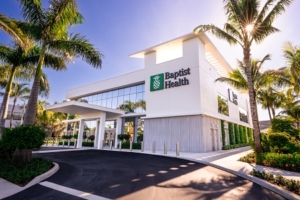Baptist Health And The Miami Dolphins Announce The Opening Of New Orthopedic Complex
Baptist Health is pleased to announce the opening of its new, state-of-the-art orthopedic complex across the street from Hard Rock Stadium, home of the Miami Dolphins.
Serving Dolphins players and the public alike, the new location offers comprehensive orthopedic care with a full range of diagnostic imaging, physical therapy and rehabilitation services all under one roof.
 The expansive, 17,000-square-foot facility is located adjacent to the Baptist Health Training Complex, the Dolphins’ training facility, with clinical areas overlooking the team’s practice field. The new location will provide the public with high-quality orthopedic care, featuring cutting-edge technology and renowned Baptist Health medical experts.
The expansive, 17,000-square-foot facility is located adjacent to the Baptist Health Training Complex, the Dolphins’ training facility, with clinical areas overlooking the team’s practice field. The new location will provide the public with high-quality orthopedic care, featuring cutting-edge technology and renowned Baptist Health medical experts.
“This new facility serves as a symbol of Baptist Health’s dedication to both our community and our partnership with the Miami Dolphins,” said Javier Hernandez-Lichtl, CEO of Baptist Health’s Doctors Hospital and Baptist Health Orthopedic Institute. “With its ideal central location, the orthopedic complex will provide even more members of the community with our trusted care, and we look forward to inviting our patients in.”
The new orthopedic complex commemorates the decades-long relationship between the Miami Dolphins and Baptist Health, which serves as the Official Medical Team and Official Wellness and Sports Medicine Provider for the team. In July 2023, the two entities celebrated the two-year anniversary of the unveiling of the Baptist Health Training Complex where the team, coaching staff and football support staff are headquartered year-round.
“We are excited for the community to ‘go where the pros go’ and experience the same level of expertise we provide the exceptional athletes of the Miami Dolphins,” said John Uribe, M.D., orthopedic surgeon and Chief Medical Executive with Baptist Health Orthopedic Care and head team physician of the Miami Dolphins. “This orthopedic complex is the pinnacle of medical expertise, advanced treatment options and expedient care for all patients.”
“Baptist Health has been an incredible partner for many years, and it’s a privilege for us to join them in serving both our community and the players alike by bringing this world-class facility to our backyard,” said Jeremy Walls, Chief Revenue Officer of the Miami Dolphins and Hard Rock Stadium. “We’re excited that the public will be able to step foot on our campus and experience the same standard of care as our team in this new, innovative space.”
Baptist Health is also a proud partner of the Miami Dolphins Foundation, working together on a series of initiatives around the health and safety of South Florida students, coaches and parents to grow youth football participation in the region.
The orthopedic complex will begin seeing patients on August,14 at 19955 NW 27th Avenue, Suite 200, Miami Gardens. The entrance to the facility can be found at Gate 11, located on NW 27th Avenue between 199th Street and 203rd Street. Patients must have an appointment to receive care.
Source: South Florida Hospital News




